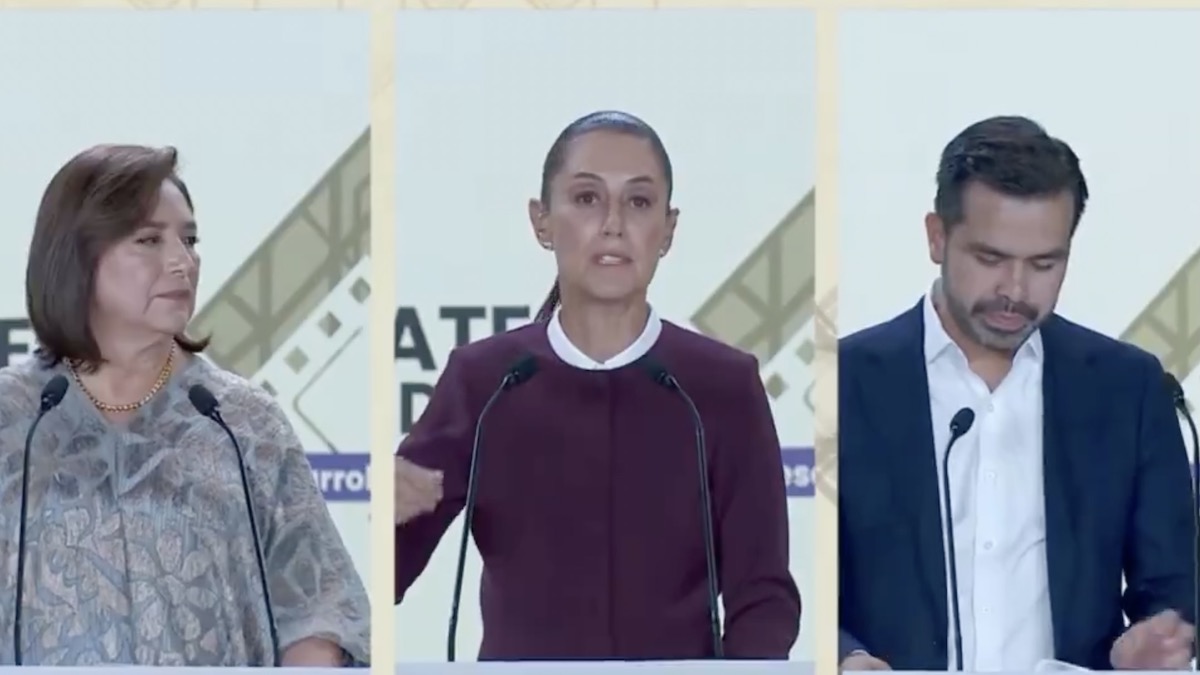On Sunday April 28, the National Electoral Institute (INE) held the second debate between the candidates for the Presidency of Mexico. The questions were recorded by members of the public and displayed during the debate.
Candidates Claudia Sheinbaum, from the Morena, PT, Verde coalition “Let’s Continue Making History”, Xóchitl Gálvez, from the PRI, PAN, PRD coalition; and Jorge Máynez, for the Citizen Movement party, responded to citizens’ questions and presented their proposals on the topics of economy and inflation, infrastructure and development, poverty and inequality, as well as the climate crisis and sustainable development.
Attacks launched from the get-go
Unlike the beginning of the first debate, in this one Xóchitl Gálvez acknowledged being the candidate representing the PRI-PAN-PRD for this election. Claudia Sheinbaum did not overlook this fact and pointed out that these are the parties that have already governed under a neoliberal economic model and “failed by generating more unemployment, inflation, privatization and increased taxes.”
The first block of the debate was marked by the intensity of the attacks launched by Xóchitl Gálvez towards Claudia Sheinbaum about alleged acts of corruption involving herself, her ex-husband, or the children of President López Obrador. She even repeated the slogan of the opposition campaign on social networks stating that there is a “narco-government.”
Sheinbaum turned the accusation around, pointing out that “the only declared narco-government that has existed is that of Felipe Calderón, of the PAN,” in reference to the trial in the United States where Genaro García Luna, Calderon’s Secretary of Public Security, was found guilty for various crimes related to drug trafficking.
Read more: Conviction of former Mexican security chief for taking bribes from drug cartels is “just the tip of the iceberg”
Sheinbaum added that if Gálvez had evidence to back up her claims, she should file the corresponding complaint.
The third candidate present, Máynez, divided his time between attacks and accusations against the unfulfilled promises of the PRI and PAN presidents, parties that Gálvez represents today, accusations against Sheinbaum for her management in Mexico City, and proposals which he hopes will help him get more than 7% of the electoral preference which he has been stuck at in the majority of polls.
From the “real estate gang” to the “candidate of lies”
Gálvez’s major attack against Sheinbaum was calling her a liar, at every chance she got. She asserted that the Morenista candidate “lies because she lies,” and every time Sheinbaum responded with data about the accusations that the PAN member made, she responded by calling her a liar. The PRI/PAN candidate also resorted to posters that she placed in front of her podium while Sheinbaum spoke, an act that moderators specifically said was prohibited during the debate.
Despite the decision by the Electoral Institute of Mexico City (IECM) to prohibit MORENA from making references to the PAN Real Estate Cartel, Claudia Sheinbaum accused Xóchitl of approving irregular construction projects, in exchange for hiring her companies for the jobs -thus renaming the “real estate cartel” “PRIANDILLA”.
In an attempt to defend herself against this and other corruption accusations, Gálvez stated that it is not illegal to have companies, since the contracts were not made with the entities where she was in charge, but with other public institutions.
Due to these acts of probable corruption, the former Head of Government referred on several occasions to the former Mayor as “the corrupt one”, since, she clarified, it is illegal to be a public official and have contracts with companies that are benefiting, according to the Law of Acquisitions where possible cases of conflict of interest between officials, government entities, and private companies are laid out.
The proposals for Mexico
As the central point when making proposals, the candidates relied on the work that their political parties have already carried out while they have been at the head of the Federal Government.
Gálvez denied the progress of the administration of AMLO but proposed, contradictorily, to maintain the social programs created by the current government. Despite having tried to block them in the legislative branch, the opposition candidate stated that she will now seek to increase social programs for children and young people. Xóchitl was against the current policy of guaranteeing energy sovereignty by strengthening the parastatal energy companies, PEMEX and CFE, and proposed returning to public-private partnerships. She also urged to modernize the field and support entrepreneurs with tax benefits if the reduction in working hours is to be approved.
As her final words, the former senator for PAN stated that there are two paths: “give up” or wake up to stop living in a Mexico “with authoritarianism” and invited the population to vote for her ticket.
Sheinbaum recognized the achievements obtained by the government of President Andrés Manuel López Obrador in the areas of combating poverty, creating infrastructure, and recovering purchasing power. The former Head of Government of the capital listed her proposals on new topics, such as the mitigation of greenhouse gases, a Water Plan for the entire country, the creation of housing, and support for small producers in the countryside.
This article was translated from Spanish and first published on De Raíz.





